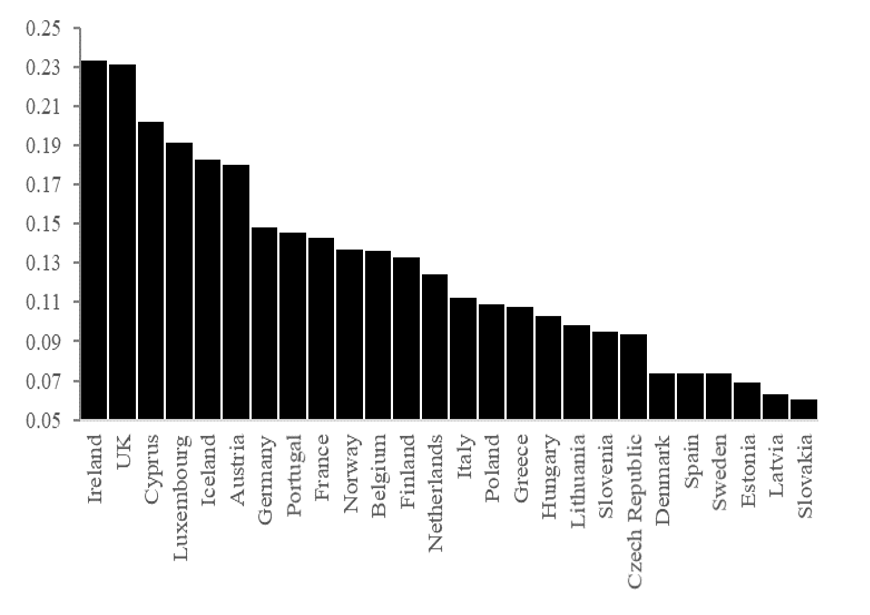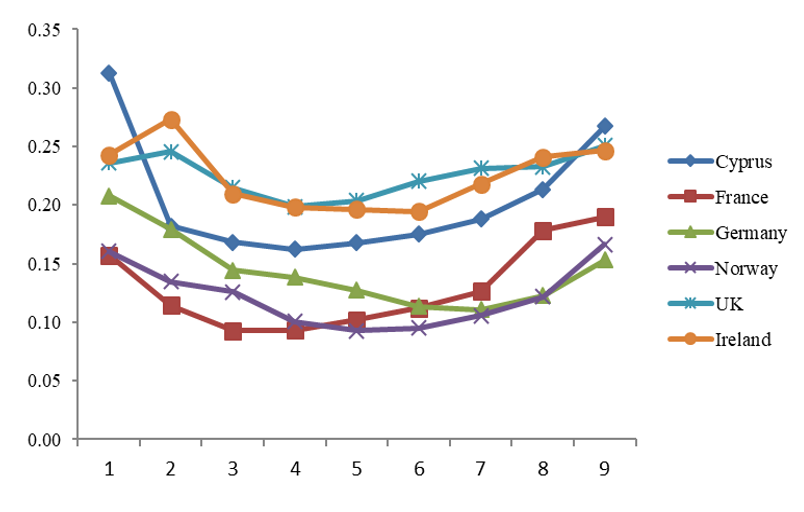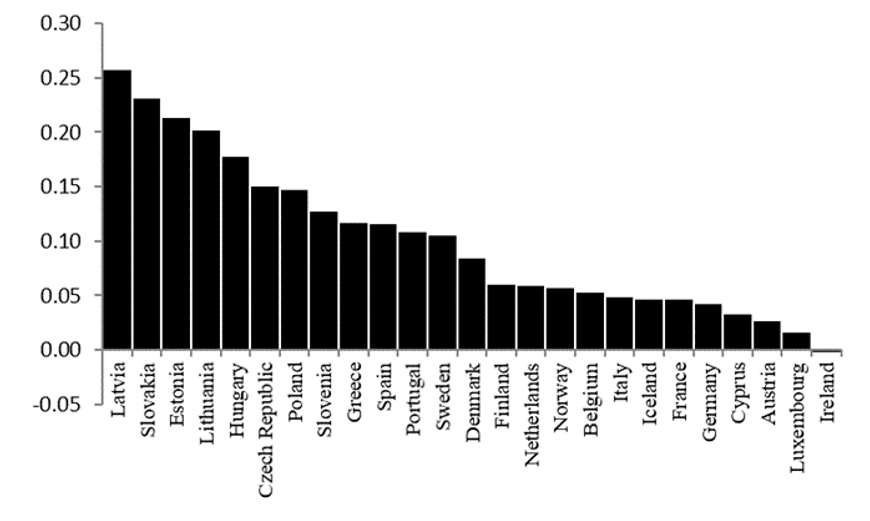Wage premiums for supervisors in the UK play a significant role in attracting and retaining more skilled workers from the European Union. The national context, including the type of employment contracts, salary limits, working hours and regulations, also contribute to the country’s appeal for workers in supervisory roles. Leone Leonida, Antonio Giangreco, Sergio Scicchitano and Marco Biagetti write that policymakers must consider these factors to formulate immigration policies and maintain an inclusive and diverse labour market.
Brexit raised a key discussion about the mobility of European citizens. The Boris Johnson government decided to allow immigrants based not much on which country they come from, but more on what skills they offer. Points were given to those who have secured a job offer, or have the skills to secure it, and speak English. The goal was to cherry-pick talented employees among those willing to come to the UK. However, the new bureaucratical burdens may well reduce the country’s ability in attracting these talented employees.
In two studies (here and here), we investigated the UK’s pre-Brexit attractiveness for employees in supervisory roles compared to Germany first, and to the other EU economies. We did this by estimating the wage premium to supervision, that is, the wages earned by supervisors on top of the salary that others earn.
Our results show that: first, other things being equal, the UK offers higher rewards to supervisors. Second, in many economies the premium rises along the distribution of wages and this, in turn, contributes to greater inequality. Third, about 10 per cent of the premium is influenced by the economic context where supervisors work. Finally, the premium attracts supervisors to the UK. These findings have important implications for immigration policies and policymakers, particularly in the context of the post-Brexit landscape.
1. The UK offers higher rewards to supervisors
Other things being equal, supervisors receive higher wages compared to production workers because of their role. This is true throughout EU economies, even if to different extents. The presence of a wage premium for supervisors underscores the significance of these roles and highlights their impact on earnings.
In the UK and Ireland, the premium is on average higher than in all the other economies, making the UK labour market more attractive to supervisors. There are differences across countries. There is a first group of economies that pay a high premium for the role, including Ireland (23.4%), the UK (23.2%), Cyprus (20,0%), Luxembourg (19.2%), Iceland (18.3%), and Austria (18.1%). There is a second group paying an intermediate premium (Germany, Portugal, France, Norway, Belgium, Finland, and the Netherlands), a third group comprising Italy, Poland, Greece, Hungary, Lithuania, Slovakia, and the Czech Republic, and a fourth group involving Denmark, Spain, Sweden, Estonia, Latvia, and Slovakia, with the lowest premium (6.1%).
Figure 1. Premium for supervision across the EU economies and the UK

2. The premium increases inequality
Supervisors earn a different premium in each of the EU economies. When wages are higher than the mean the premium is larger. For 11 of 26 EU economies, the premium is higher at the median than at the first decile (the lowest 10 per cent of salaries). The highest premium at the first decile is paid by Cyprus and at the ninth decile (90 per cent of salaries are below) by Portugal. The lowest premium at those deciles is paid by Slovakia and Slovenia. The results suggest that premiums raise inequality. And individuals at the same deciles but working in different economies earn a different premium. The UK pays a relevant premium to those having a relatively low wage.
Figure 2. Premium for supervision at wage distribution deciles (selected economies)

3. About 10 per cent of the premium is due to national context
The national context plays a pivotal role in shaping wage premiums. Economies such as Ireland and the UK exhibit higher average wage premiums compared to other EU economies, making the UK labour market more attractive to supervisors. The national context encompasses various factors, including employment contracts, salary limits, working hours, and industrial relations regulations, which collectively contribute to the appeal of the UK.
Figure 3. The impact of economic context on the supervisors’ premium in the EU

4. The premium attracts supervisors
We found that the presence of wage premiums is positively correlated with a higher percentage of supervisors in the labour market. Premiums shape their mobility and contribute to the inflow of these skilled workers from other EU economies.
Policy implications
Policymakers need to ensure that the UK remains an attractive destination for highly skilled professionals. They must consider the national context and the role of wage premiums to formulate post-Brexit immigration policies that align with vocational training plans to meet the needs of skilled workers in various sectors.
Future research
There are several avenues for future research. Long-term analyses are necessary to evaluate the lasting impact of Brexit on the mobility and compensation of supervisors. Research is needed also on the impact of the points-based immigration system prioritising job offers, skills, and English language proficiency for citizens who want to enter the UK. Understanding trends and changes in the number of European supervisors entering or leaving the UK, as well as their corresponding compensation levels, would provide valuable insights about the evolving dynamics of the labour market.
The economic conditions faced by the UK, including the impact of Brexit and the COVID-19 pandemic, may significantly influence the mobility of European supervisors. Research on how economic conditions shape the willingness of supervisors to migrate and work in the UK would provide a deeper understanding of the factors influencing their decisions and the potential consequences for the labour market.
Sector-specific analyses would yield valuable insights into the variations and dynamics within different industries. Sectors such as finance, technology and healthcare may be more reliant on European supervisors. Understanding how Brexit and economic conditions impact these specific sectors would be valuable for workforce planning.
Policy evaluation is crucial to determine the effectiveness of the points-based immigration system in attracting and retaining skilled supervisors. Assessing the impact of immigration policies on mobility patterns, compensation levels, and overall competitiveness of the labour market would help policymakers refine their strategies and make informed decisions.
Finally, comparative analyses with EU countries would provide a broader perspective on the attractiveness of the UK labour market. Analysing differences in policies, wage structures, and economic conditions between the UK and EU countries would shed light on the competitive advantages and disadvantages that the UK offers to supervisors. This research could inform policy discussions and strategies to position the UK as an attractive destination for highly skilled supervisors, even in the face of economic challenges.
- This blog post is based on Britain and BrExit: Is the UK more attractive to supervisors? An analysis of the wage premium to supervision across the EU, by Leone Leonida, Antonio Giangreco, Sergio Scicchitano, Marco Biagetti, in the British Journal of International Relations, Volume 61, Issue 2, June 2023.
- The post represents the views of its authors, not the position of LSE Business Review or the London School of Economics.
- Featured image by Shutterstock
- When you leave a comment, you’re agreeing to our Comment Policy.





